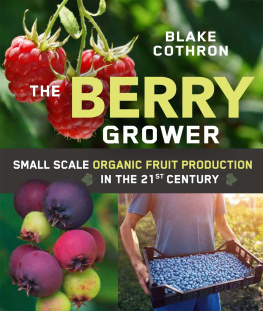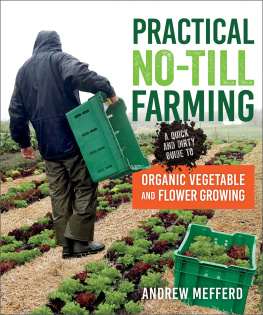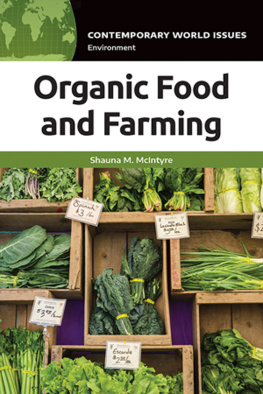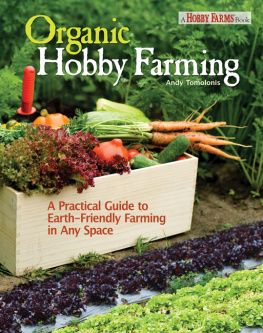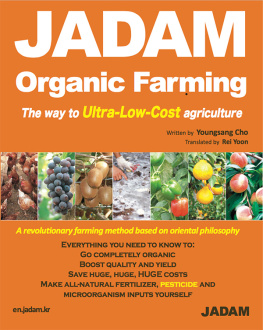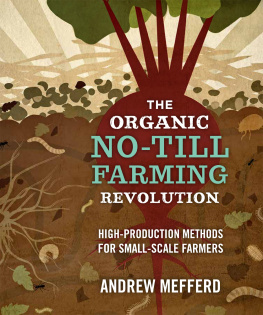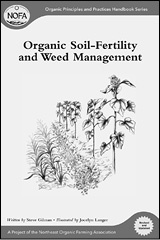


To all the leaders of the world,
who hold our future in their hands.
To my whole family who shares this honorable path with me.
And to the farmers.
CONTENTS
FOREWORD
ERIC SCHLOSSER
Pesticides are poisons. They are manufactured to kill insects, rodents, fungi, and weeds. But they can also kill people. Organophosphatesone of the most common types of pesticidewere developed in Nazi Germany to be used as chemical weapons. It was later recognized that the same sort of nerve gases formulated to attack enemy soldiers and civilians could be used against agricultural pests. During the past 60 years organophosphates, organochlorines, N-methyl carbamates, synthetic pyrethroid insecticides, herbicides, fungicides, and fumigants have been applied to the American landscape on a massive scale. During the first year of President George W. Bush's administration, the Environmental Protection Agency (EPA) stopped counting how much pesticide was being used in the United States. The federal government hasn't conducted a survey of pesticide use since 2001. And the chemical companies that sell these poisons don't seem eager to let people know how much is really being sprayed. A conservative estimate of current pesticide use in American agriculture would be about 1.2 billion pounds a yearabout 4 pounds of the stuff for every American man, woman, and child.
Despite industry claims that widespread pesticide use poses little threat to the public health, the latest scientific evidence suggests otherwise. Almost everyone in the United States now has pesticide residues in his or her blood. The effects of direct exposure to various pesticides aren't disputed. Pesticides can cause damage to the central nervous system, brain damage, lung damage, cancer, birth defects, sterility, and death. The long-term effects of minute residues within the body are more subtle. Recent studies suggest that behavioral and developmental problems may be linked to childhood pesticide exposure. And that exposure begins at almost the moment of conception. Pesticide residues are routinely detected in the amniotic fluid of pregnant women.
A number of the same companies that unleashed a witch's brew of toxic chemicals into the environment have, during the past decade, eagerly promoted the introduction of genetically modified organisms (GMOs). Monsantoonce the manufacturer of such notorious pesticides as DDT and Agent Orangenow controls about 90 percent of American soybean production, through patents on its genetically modified seeds. The company also controls about 60 percent of corn production. Its leading competitor in the market for GM seeds is Dow Chemicala firm that over the years has manufactured pesticides, plastics, napalm, and the plutonium cores of nuclear weapons. Although the health risks of eating genetically modified foods haven't been established, these new transgenic seeds have been dispersed throughout millions of acres of American farmland without much study of their potential effects upon human beings or the environment. The federal panel that approved the speedy introduction of GMOs during the 1990s was headed by Vice President Dan Quayle. A man who couldn't even spell the word potato was responsible for allowing the sale of genetically modified potatoes.
The technological mindset that would dump billions of pounds of deadly chemicals onto the soil, and mix the genetic material of different species, and build factory farms where livestock are treated like industrial commodities, and clone animals in order to give them a uniform size, has a deeply arrogant view of the natural world. It regards Nature as something to be conquered and controlled for a short-term profit.
The organic movement embodies a different mindset. It takes the long view. It seeks the kind of profit that can last for generations. It regards the natural world with a profound reverence and humility. It aims to work with Natureand considers the whole notion of controlling Nature to be absurd. At the heart of the organic movement is a belief in the interconnectedness of things. What you put into the soil winds up in the crops that grow in the soil, winds up in the animals that eat those crops, winds up in the people that eat those animalsand ultimately winds up in everything, since all things return to the soil. As all of us will one day return to the soil.
Maria Rodale is uniquely qualified to speak on behalf of this movement. Her grandfather, J. I. Rodale, founded the magazine Organic Farming and Gardening in 1942, just as the chemical-based, industrial agricultural was taking root. Her parents, Robert and Ardath Rodale, devoted their lives to championing organic agriculture and a holistic approach to living. Maria brings to the subject not only her family legacy, but also her personal experiences as a mother, businesswoman, and activist who has been around farmers and farming all of her life. She understands the inextricable link between the health of the land and the health of the society built upon it. This book conveys the importance of the organic movement, at a time when a handful of corporations are trying to control our food supply, when climate change and future petroleum shortages threaten the entire basis of today's industrial agriculture. This book is full of Maria's wisdom, optimism, and common sense. In a remarkably brief period of time, we have done tremendous damage to the environment and to ourselves. Here you will find how we can start to undo it.
INTRODUCTION
Think about what you think you know about organic food for a moment:
Some people say it's more nutritious, but others say it's not. Maybe it's the right choice for wealthy developed nations, but is it practical for underdeveloped and poor countries? Isn't it more important to eat food produced locally? What's the difference between organic and natural? And why are organic foods so expensive? Doesn't the high cost of organic food make it an elitist indulgence rather than a realistic choice for the majority of working families? And we seem to hear all the time that it's not even possible to grow enough food to feed the world organically. What's the truth?
We are, as a culture, bombarded by so much information all the time, yet much of it draws conflicting conclusions and never seems to provide a definitive, clear answer to the question of why we should opt for organically grown foods rather than those grown with synthetic chemicalshungry and try not to think too much about it because it's all so disheartening and confusing.
Well, I've thought a lot about it. Even more important, I've done the research. In the process of writing and researching this book, I found that there are clear and conclusive scientific data that support my hypothesis that organic agriculture is the key to our survival. The studies are buried deeply within the databases of government agencies, too complicated to be reported by the mainstream media, and subjected to downright suppression at some universities. A quick peek beneath the shiny veneer of the marketing materials of major chemical companies reveals a world where the overriding drive for growth and profits has created a culture of denial that makes victims of us all. I talked with leading scientists and doctors. I read shocking historical accounts of forgotten periods in our past. I spoke with organic farmers, business leaders, and writers. But most important, I spoke with many chemical (or conventional) farmers from around the country. It was their stories that made it even clearer to me that we need to change.
Next page

